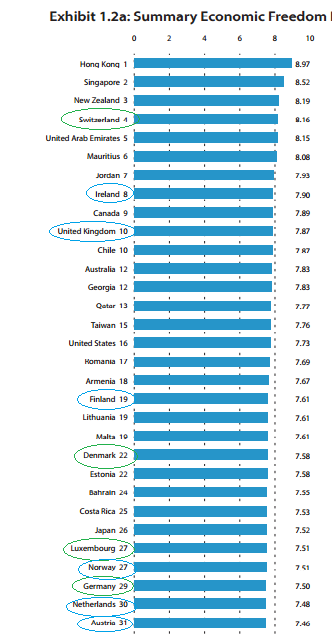


If you value what we do, please consider making a donation.On February 2, the Economic Freedom Fighters (EFF) unveiled its election manifesto with spectacle and fiery rhetoric characteristic of its leader, Julius Malema. Proof, if proof be needed, that prosperity, freedom and capitalism are inextricably inkedĬlick here to subscribe to our daily briefing – the best pieces from CapX and across the web.ĬapX depends on the generosity of its readers. The gross national product per capita in countries rated as economically ‘free’ was $73,973, in countries that are ‘mostly free’ it is $45,519, in ‘moderately free’ countries it is $21,803, in “mostly unfree” countries it is $9,917, and in “repressed” countries it is $7,096.
#ECONOMIC FREEDOME FREE#
Subscribe to Free Exchange, the CapX podcastĪccording to the index, the world’s most economically free countries are Singapore, Switzerland, Ireland, New Zealand and Luxembourg, while the least free countries are Cuba, Venezuela and North Korea.With the prosperity of many of the world’s leading nations now so heavily dependent on economic developments in China, the country’s declining economic freedom sends a warning signal to the rest of the world too. Zhang continues, ‘In my view, the market economy is the only system through which common prosperity can be achieved… If China attempts to achieve common prosperity through de-marketisation and government-dominated redistribution policy instead of continuing marketisation, the result can only be the return to common poverty.’ The renowned Chinese economist Weiying Zhang recently warned in an article for the Journal of Chinese Economic and Business Studies that, ‘Downplaying market and introducing more government interventions have been a dominant policy practice’ in recent years. In recent years, however, the trend has started to reverse. This is because in the medium term, a deterioration in economic freedom always leads to economic losses and slower growth or even a decline in prosperity.Ĭhina’s rise over the past 40 years was entirely a result of the introduction of private property and capitalist reforms pushing back the influence of the state. The fact that economic freedom is declining in the world’s two leading economies is also bad news for the rest of the world. The index for China has not been this low since it began in 1995, when China scored 52.0 points. Such substantial declines are rare in the history of the index. The decline is even more dramatic in China, where the index fell from 58.4 in the previous year to just 48 points in this year’s ranking – a drop of ten percentage points. This is also the worst result since the index has been in existence (in the previous year, the UK had a score of 78.4 in 1995, the score was 77.9). The United Kingdom – after countries such as Germany, South Korea, Chile, the Czech Republic and Austria – is only 24th in the rankings with a score of 72.7. In 20, the US scored 81.2 points on the index, but today, at 72.1 points, is in a worse position than it was in 1995, when the index was first published (76.7 points). The major causative factor in the erosion of America’s economic freedom is excessive government spending, which has resulted in mounting deficit and debt burdens.’ The study’s authors also criticise Joe Biden’s policies, which are ‘aimed at fundamentally transforming both the country and the economy’. The study states, ‘Quite notable is the continuing decline in the “mostly free” category of the United States, which plummeted to 25th place, its lowest ranking ever in the 28-year history of the Index. The index reports on how economically free or unfree any given country is and can also be regarded as the ‘capitalism scale’. This is one of the key findings of the Index of Economic Freedom 2022, which has been published by the renowned Heritage Foundation every year since 1995. Britain is now less free than Germany, South Korea and ChileĪmerica is no longer the land of the free.With the prosperity of the world so dependent on China, its declining freedom should concern us all.The world's two biggest economies have experienced dramatic declines in economic freedom.


 0 kommentar(er)
0 kommentar(er)
